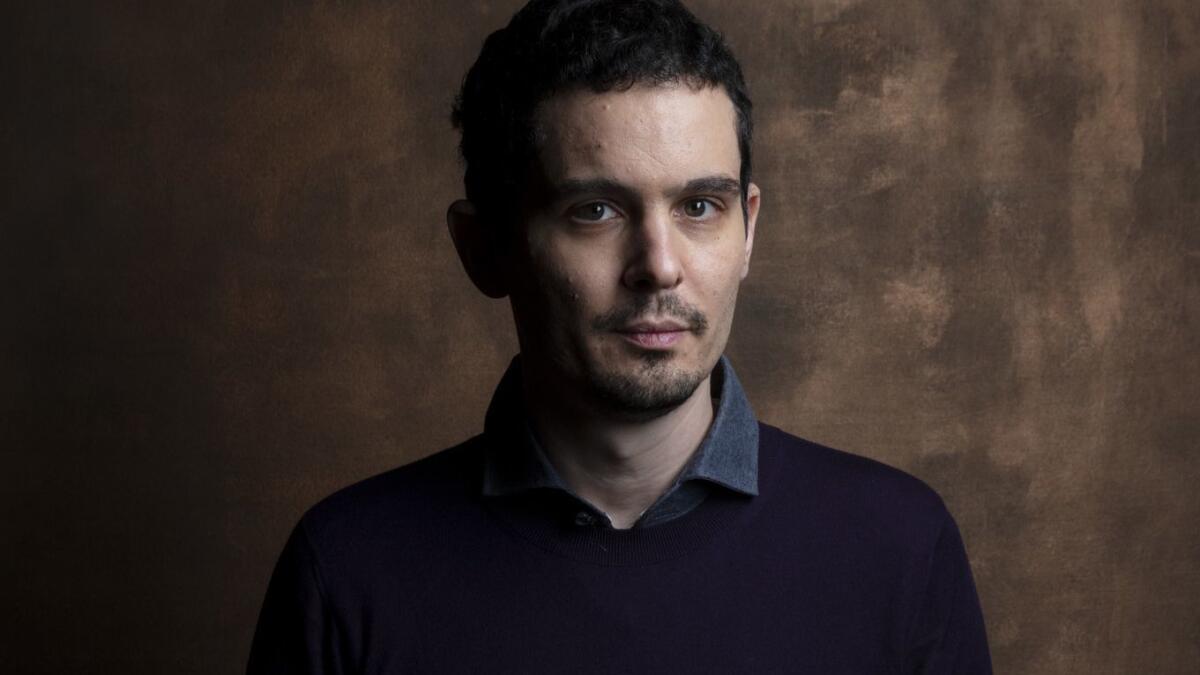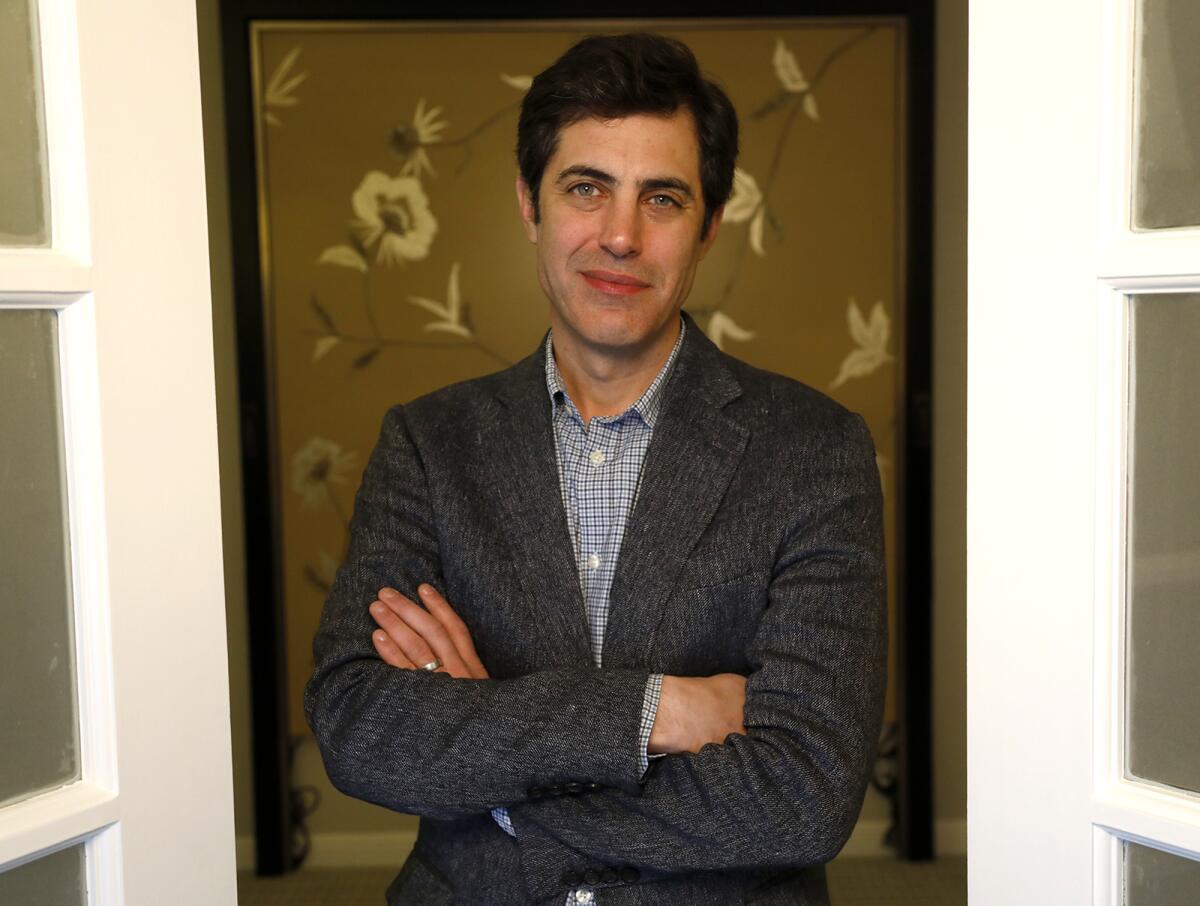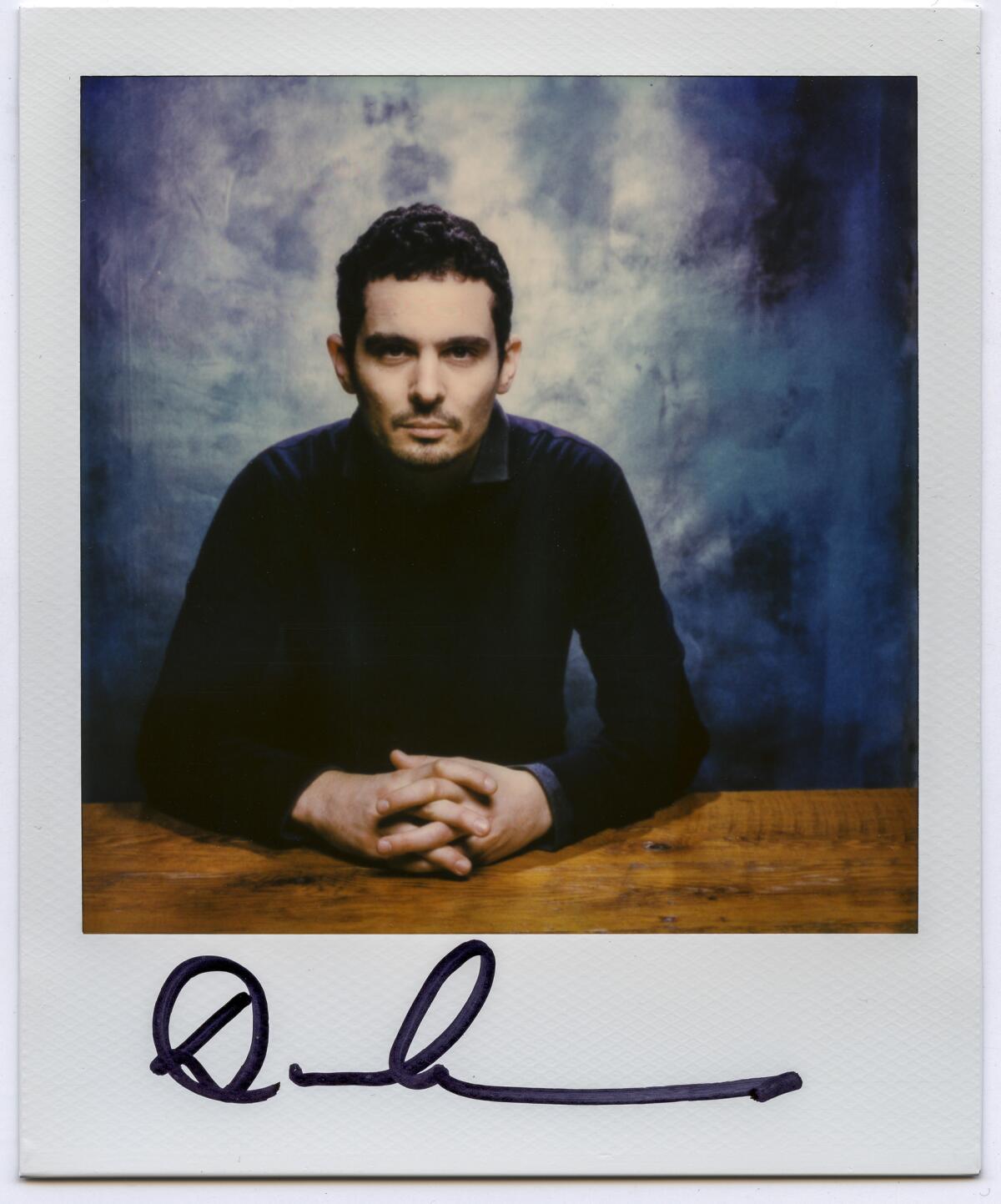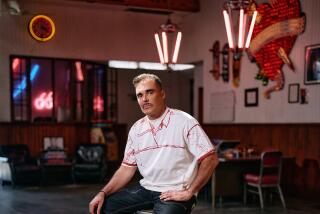âLa La Landâsâ Damien Chazelle and âSpotlightâsâ Josh Singer return to the Oscar race with âFirst Manâ

Reporting from Telluride, Colo. â Damien Chazelle just made a movie about the greatest triumph in the history of space exploration: âFirst Man,â about astronaut Neil Armstrongâs journey to become the first man to set foot on the moon. But donât expect to see him signing up with Elon Musk for a ride into the cosmos anytime soon.
âThis movie was very much shot and told from the perspective of nervous fliers,â Chazelle said with a laugh, sitting beside the filmâs screenwriter, Josh Singer, the day after its first screening at the Telluride Film Festival. âSpace travel has not been something Iâve craved doing, and this movie in many ways is why Iâm not actually personally wanting to go into space.â
Judging by the reactions to the film both at the Venice Film Festival and Telluride, though, âFirst Manâ seems likely to send the 33-year-old Chazelle â who broke out with 2014âs âWhiplashâ and became the youngest person to win the best director Oscar for the 2016 musical âLa La Landâ â back into awards-season orbit.
Early reviews have praised âFirst Manâ â which stars Gosling as Armstrong and Claire Foy as his wife Janet and hits theaters Oct. 12 â as a viscerally and emotionally gripping account of Armstrongâs story, even as some controversy has erupted over Chazelleâs decision not to dramatize the moment when Armstrong planted the American flag on the moon. (For the record, there are multiple shots of the American flag next to the Apollo 11 lunar lander, as well as at various other points in the movie.)
The Times spoke with Chazelle and Singer, who won the original screenplay Oscar with Tom McCarthy for âSpotlight,â about finding Armstrong as a character, the flag flap and balancing artistic and commercial ambitions in this sweeping space odyssey.
âWhiplash,â âLa La Landâ and âFirst Manâ are all incredibly different movies but on one level theyâre all about people pursuing a difficult dream and what they have to sacrifice along the way. Damien, is that a conscious thread for you?
Chazelle: I think thatâs what got me into the idea for this movie. Because I didnât grow up as a space nut. I didnât grow up wanting to tell a Neil Armstrong story per se. It was starting to think about it and looking at the archival materials and realizing, âOh, this myth, this story that seems so gleamingly successful that itâs almost sort of bland â thereâs actually a tortuous journey to that success story that was beset by failure and loss and tragedy.â
Suddenly then it felt like another variation on that theme of what the price of pursuing a goal like that is on the individual, on the people around them â and with a mission like this, certainly what the price was on the whole nation that shouldered it.
Singer: The idea of puncturing the myth and getting at the human cost â I mean, Neil was one of nine guys in the second group of astronauts, and two of them died and those two happened to be his closest friends in the program. There was incredible loss and sacrifice here.
These guys were not supermen. They were just ordinary men and women doing their best and sacrificing greatly in order to achieve something for all of us. And in an era right now when we face impossible tasks â like how are we going to take on climate change and save our species â I think this sugar-coating thatâs been done does a disservice. Thereâs no hero coming to save us. We have to all step up and sacrifice the way these guys did. I think thatâs inspiring.

In a lot of popular culture, like the movie âThe Right Stuff,â the early astronauts have been portrayed as kind of macho space cowboys. The Neil Armstrong we see in this movie is not that at all â heâs a serious engineer whoâs emotionally very self-contained.
Chazelle: I think the New Nine group of astronauts were less of the space cowboy types than the original [Mercury] 7, which was âThe Right Stuffâ â and within the New 9, Neil was by far the least space cowboy of that group. To me, that makes him both more relatable and harder to fathom. Because itâs one thing to look at the kind of hotshot pilot who brags about cheating death, that adrenaline-junkie type, as a character. Itâs another to look at someone like Neil.
My dad is a mathematician and aspects of him remind me of Neil: just someone who liked to sit in his attic and work on math problems and live in his head all day long. For someone like that to then be willing and even desiring to put themselves in totally death-defying situations, it made it both more interesting to me and harder to figure out.
The fact that he was so self-contained, that he was so private, I think that made him very poignant as a hero. Thereâs this fundamental mystery about him that I think makes him endlessly compelling.

How did you get inside his head then?
Chazelle: By the time we started working on the movie, Neil had died a few years prior, so I think the biggest thing for us was just leaning as much as we could into everyone who knew him well from different aspects of his life.
His sons were incredibly helpful to us. His wife at the time, Janet, gave us a lot of her time very generously. Jim Hansen, his biographer, had all his original notes from his conversations with Armstrong. I went to Ohio with Ryan to visit the farm where Neil grew up and sit with his sister and childhood best friend. And then there were people like Dave Scott and Mike Collins, who had flown with Armstrong, trained him, worked side by side with him. We didnât have Neil to turn to, but we had this kind of galaxy â sorry for the pun â of people around him to lean into.
In the last couple of days, controversy has flared up over your decision not to show Armstrong planting an American flag on the moon. Were you surprised when this came up, or did you consider as you were planning out that part of the film that some people might feel that moment should be in there?
Chazelle: I mean, it surprised me because there are so many things that we werenât able to focus on not only during the lunar EVA [extra-vehicular activity] but in the entirety of Apollo 11. Just by the nature of the story we were telling, we just couldnât go into every detail. So our through-line became â especially at this part of the movie where itâs the final emotional journey for Neil â what were the private, unknown moments of Neil on the moon?
The flag was not a private, unknown moment for Neil. Itâs a very famous moment and it wasnât Neil alone. We included the famous descent down the ladder because thatâs him alone, literally first feeling what itâs like to be on the moon. But other than that, we only wanted to focus on the unfamous stuff on the moon. So we donât go into the phone call with Nixon, we donât go into the scientific experiments, we donât go into reentry, et cetera.
What was important to us was that mysterious 10 minutes that Neil spent alone at the Little West crater, the walk that he took to that crater separate from Buzz [Aldrin] â during which time, of course, we wanted to look back and see the flag standing proudly by the LEM [lunar excursion module], which we showed in several shots. Neil never really talked about what he did at that crater or what he was thinking about. And in terms of the process of being on the moon, I think we were exclusively interested in the private and the less knowable.
Singer: I think thereâs something else at play, too. If you look historically, the moon mission was initially very much about the competition between the U.S. and the Soviets and it was very much born of the Cold War. But as you move through the â60s, that competition falls away just a bit and it becomes about something else. So much changes around these astronauts â the civil rights movement, the Vietnam War â and the moon mission is no longer a top priority. In fact, most Americans actually think weâre spending too much on the moon by the time they go.
By the time they get there, it really becomes something that was âfor all mankind,â which was on the plaque that they put up. They debated whether to put up a U.N. flag or an American flag. And the government was very adamant about them doing a world tour afterwards to make it feel the way it felt when they landed, which was as a victory for humankind in addition to a victory for America. So I think there are other historical aspects at play.
If nothing else, the whole flap highlights how polarized things are now and the fact that everything is being viewed through a political lens. Do you see this movie as having a political message in any way?
Chazelle: I think the focus for me and for Josh and Ryan on this was on the personal and not the political. That said, I think itâs fair to say that, whether weâre talking about today or the whole history of movies up to today, every movie, every work of art, has a political component whether it wants to or not.
To me, if thereâs a political component here, itâs actually trying to, again, puncture some mythology that I think has actually in some ways done some disservice to us as people who want to learn from the past.
Growing up, I just saw this period as a string of successes. This was America at its greatest. There were superheroes that went out into space and everything went perfectly because everyone was so great. And I think â especially in a day and age when we face so many challenges â that can make you defeatist in a way because you think, âOf course, weâre not going to be able to do X, Y and Z because we donât have âthe stuffâ they had back then.â
These people were not superheroes. They were fallible human beings struggling to do something, working very hard at it, and mostly failing. As Neil says in the movie, âYou fail down here so you donât fail up there.â Mostly what they did down here was fail and sometimes that cost lives, it certainly cost a lot of money and it created a lot of controversy.
The more you delve into the nitty-gritty of it, the more messy and difficult that whole chapter was. And that, I think, actually makes it much more useful for today: to learn from those mistakes, learn from those successes, learn from all of it and not just think, âWell, back in the gilded days we knew how to do things and now we donât.â Thatâs just not true.
This is a big-budget commercial movie that also has big artistic ambitions. Did you feel a tug-of-war between those two demands?
Chazelle: I went into it with some trepidation that that might be something weâd have to navigate, but I feel really lucky to say that it never really felt like that.
It was always about making it feel like a documentary, making it feel like a home movie that extended into the spacecrafts, and that this was going to be a dark, complicated movie. This was not going to be something that it didnât want to be. We were very open about that from the get-go, and we were very lucky to have great producers and a studio that supported it and champions along the way that helped protect the movie. I never felt like we had to make a single creative compromise along the way to sort of please the commercial masters, so to speak.
We wanted to do something that did both. Itâs still kind of the holy grail, when I think of the â70s, when things like that werenât mutually exclusive, where you can do something on a big scale that demands to be seen in a movie theater but that is just as intimate and maybe at times weird and personal as any arthouse film, whatever that means.
This interview has been condensed and edited.
More to Read
Only good movies
Get the Indie Focus newsletter, Mark Olsen's weekly guide to the world of cinema.
You may occasionally receive promotional content from the Los Angeles Times.











